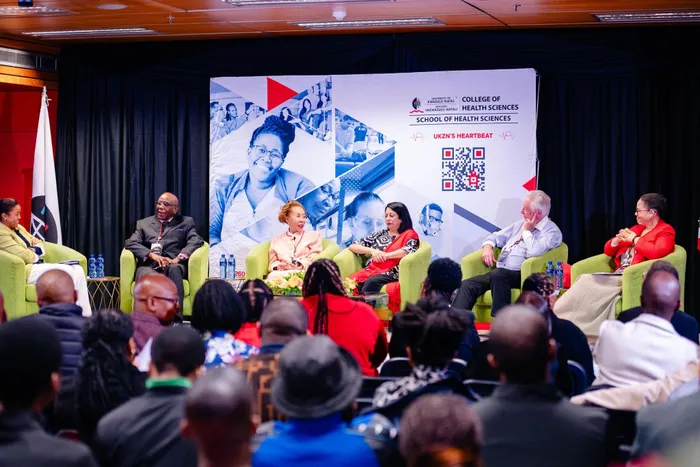Honouring medical pioneers: Insights from UKZN's living legends panel

UKZN's living legends
Image: Facebook
The University of KwaZulu-Natal’s Nelson R Mandela School of Medicine this week hosted its annual 'On the Couch with Our Alumni Living Legends' panel discussion to honour four industry giants within the medical field.
The living legends who were part of the panel were Dr Tshepo Motsepe who is South Africa's first lady, a physician, businesswoman, and patron of the Early Care Foundation; Professor Bilkish Cassim, an esteemed rheumatologist, academic and inaugural chair of geriatrics at UKZN; Dr Diliza Mji, founder, shareholder and director of the Busamed Group and Dr Warwick Morris, a renowned plastic and reconstructive surgeon with over five decades of service.
The purpose of the gathering was to honour the alumni and teachers of the medical school.
Mji said when he left medical school as a specialist to go into private practice, he felt intimidated about going into practice because, at the time, there wasn't an African person in Durban who was in private practice as a surgeon.
"Forced to earn a living for my family, I was forced to go to Zimbabwe to look for a job, but when they offered me a salary, I said I'm coming back home.
"Practice itself then led me to go into business because I then found certain things that were happening in private practice that I was not happy about. I said one day I will do it differently and that's how I started Busamed," said Mji.
Motsepe said she grew up and went to school in a rural village.
"In those years you would hear about diarrhea. My mum was a midwife in the village. We used to receive an injection because of TB. There were so many deaths from TB that we got to learn about as a child.
"There were so many diseases. If we had proactive ways to prevent children from dying," said Motsepe.
She said after completing her internship she went to Zimbabwe on holiday and stayed on for two years and worked.
"There were so many tropical illnesses, preventable illnesses, malnutrition and stunting. I later learnt there was a course I could do on maternal child health. Even now that is where I do most of my work with creches. These are owned by female entrepreneurs. That is the area where we've had the most effect of making sure that the children are in a safe and secure environment," said Motsepe.
When asked what personal sacrifices and moments of resilience had shaped her path, Motsepe said at the age of nine she had to go to a boarding school after attending the rural school.
"My dad did not want us to be exposed to Bantu education. My dad wanted us to get a better education. Every year in January, he used to fly to Cape Town with a lawyer and apply for us to go to a coloured school in the Eastern Cape. This was a Catholic convent.
"I went at the same time with my sister. We used to spend five months of the year away from home. There was a lot of homesickness. The first day when we arrived my sister and I didn't even know English and Afrikaans," she said.
She said they were thrown into an environment where outside the classes they spoke Afrikaans and the education was done in English.
"But we had to cope. So we used to leave home in January, come back in June for three weeks and then go back again to the boarding school and come back in December for six weeks. That's the life that one led throughout. My younger brother was six years old when he went to boarding school and it was all to avoid bantu education. Those were the most difficult years," she said.
Cassim said she has been at the university's medical school for 50 years.
"To say that all my 50 years here were happy is not true. I've had some existential crises both as far as my professional work has been concerned and as well as my health. I think the two of them were related.
"But I think for me what has been important is firstly to believe in yourself. Secondly is to understand that bad things happen to good people and that you're not so special that nothing bad should ever happen to you and that if something does happen to you, you are seen not only not by what happened to you but how you reacted to it," she said.
Morris, who graduated from medical school in 1964, retired after 60 years in March this year.
He said his initial attraction was to be an obstetrician, but after a 40-minute lecture in plastic surgery, that aroused his interest.
Morris spent years training and gaining experience in plastic surgery in South Africa, the US and England.
He said aesthetic surgery is on patients who are not ill, don't have a disease, don't have a deformity, they just have some aspect of their appearance about which they're unhappy.
"So my philosophy towards them, I would say to them, I like to call this happiness surgery. It's all about making happy patients."